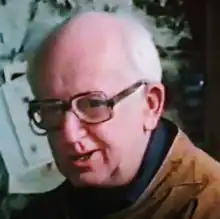Sam Smith | |
|---|---|
 At Kingswear in 1976 age 68 | |
| Born | Alan Verner Smith 27 July 1908 Shirley, Southampton, England |
| Died | 9 February 1983 (aged 74) Newton Abbot, Devon, England |
| Education | |
| Known for | toy-maker, painter and sculptor |
| Notable work |
|
| Patron(s) | |
Sam Smith (Alan Verner Smith, 1908–1983) was an artist, crafter and sculptor, known for his sculptures and toy-making for adults and children, carving wooden curios such as boats and seaside dioramas.[1][2]
Early life and education
Smith was born in Southampton on 27 July 1908.[3] His father was a steamship captain.[3] Smith attended Victoria College, Jersey.[3] He studied art at Bournemouth School of Art and Westminster School of Art.[3]
Career
Art UK writes "A lonely, introspective child, he "always wanted to be an artist", went to art school, but the 1930s Depression meant that he had to become a handyman and advertising illustrator".[4] He was unsuccessful as a painter.[3]
He started to carve and make wooden toys whilst working at an art gallery in London, and these were sold in the gallery shop.[3]
During the Second World War, Smith worked as a draughtsman, for instance producing technical drawings for the development of the Bailey Bridge in Christchurch, Dorset.[3][4][5].
His wooden toys were shown at the Royal Festival Hall following the war.[4] "Smith’s objects became bigger, more elaborate and less toy-like, based on childhood memories and colourful characters, witty but a stringent comments on society."[4] The Victoria and Albert Museum says that "His work has been described as "sculpture toys for grown-ups" ... by the 1970s they had become quite large, with unusual themes".[6]
After the war, he, his wife Gladys, and stepson lived in a steep-hillside house, The Golf House, overlooking Kingswear, Devon, and across the River Dart to Dartmouth. For making toys, Smith had many wood-cutting tools in his studio in their house. They moved from Kingswear to Newton Abbot, Devon in 1979, where he continued to create work in his studio.
A film about Smith, Sam Smith: Genuine England, was made by the Arts Council of Great Britain in 1976, and broadcast by BBC Two on Arena.[4][7]
Smith continued to be successful in the United States of America with less of a reputation in the UK until Bristol Museum & Art Gallery held a large-scale exhibition in 1972.[3][4] In 1981 the Serpentine Gallery had a joint exhibition with H. C. Westermann, an American artist who was a friend of his.[4] During this exhibition Smith suffered a stroke. This was his last show. He died in 1983.[4]
He signed much[8] of his 1930s work "Alan V". Later, he signed items "Sam Smith, Genuine England" as he became successful and sold work in London (for instance at the Primavera Gallery)[3] and New York.
Southampton City Art Gallery holds some of his work, including his painting Bathers in Southampton Water.[4][9] The Victoria and Albert Museum also has some of his work.[6]
References
- ↑ Halina Pasierbska (22 September 2005), "Smith, Alan Verner [Sam]", Oxford Dictionary of National Biography, doi:10.1093/ref:odnb/93092
- ↑ Janine Barker; Cheryl Buckley (2015), "The Primavera Story: 1946–67", British Design – Tradition and Modernity After 1948, Bloomsbury Academic, ISBN 9780857857125
- 1 2 3 4 5 6 7 8 9 "Sam Smith collection, 1972-1996, bulk 1972-1979". Yale Center for British Art. Retrieved 6 December 2023.
- 1 2 3 4 5 6 7 8 9 "Sam Smith 1908–1983". Art UK. Retrieved 6 December 2023.
- ↑ "Mr Sam Smith", The Times, London, no. 61454, p. 14, 11 February 1983
- 1 2 "Tmith (sculpture, 1973)". Victoria and Albert Museum. Retrieved 6 December 2023.
- ↑ "Sam Smith (1908 - 1983)". Contemporary Art Society. Retrieved 6 December 2023.
- ↑ Sam's 1930s toys and pictures still owned by me W Duncan Ogilvie in 2023, the godson of well-remembered Sam Smith
- ↑ "Bathers in Southampton Water". Art UK. Retrieved 6 December 2023.
External links
- Sam Smith "Genuine England" – a 1976 film by the Arts Council in which Smith explained his work
- Biography, Sam Smith 1908-1983 – personal website